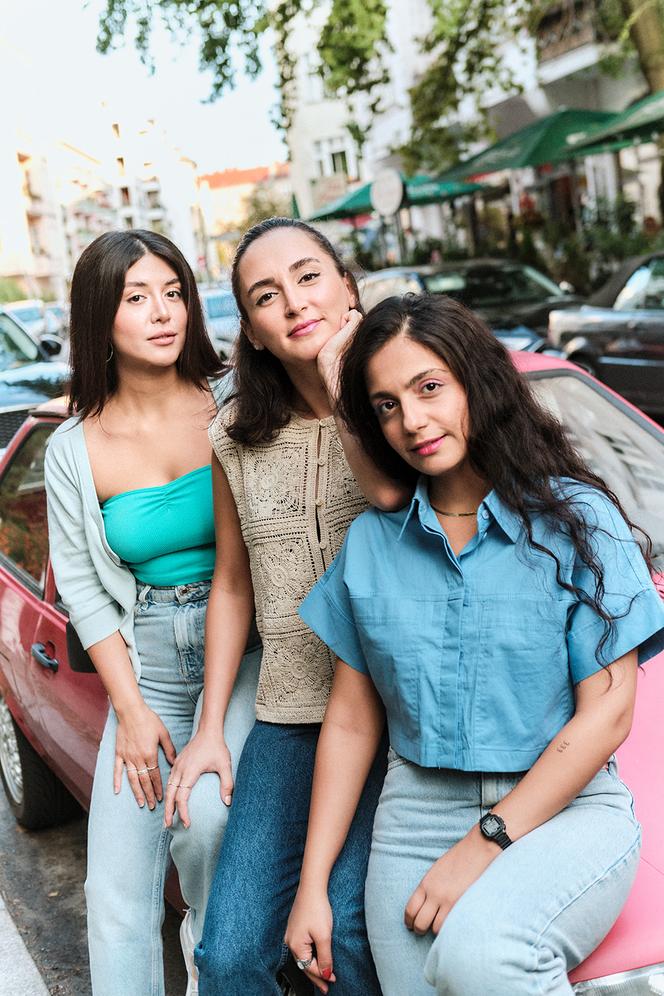Niousha Akhshi, Mahsa Rostami and Setareh Maleki were forced to flee Iran, leaving their families behind after secretly acting in director Mohammad Rasoulof’s latest film, which won the Jury’s Special Prize at Cannes. They now live in Berlin.
Subscribers only

Before appearing in Iranian director Mohammad Rasoulof’s latest film, The Seed of the Sacred Fig (in French cinemas on September 18), made without authorization in Iran, they had never met. Now living in Berlin, Niousha Akhshi, 31, Mahsa Rostami, 32, and Setareh Maleki, 32, had already had something else in common – after the death in police custody of Mahsa (Jina) Amini, in September 2022, the three actresses had decided to no longer compromise with the authorities. With more than 500 people killed in the ensuing protests, it was no longer possible for them to carry on with their work as if nothing had happened. The result was exile.
“After the uprising, I turned down all the so-called ‘official’ film and theater proposals, the ones that involved covering my hair,” said Maleki, speaking from Berlin. “If I had agreed to wear the headscarf on stage or in front of the camera, it would have effectively meant normalizing what for years has been the tool of women’s repression.” Before leaving Iran, Rostami, Akhshi and Maleki acted bareheaded in short films and underground plays. “I’ll never forget the first time I felt the wind in my long hair as I was performing in the open air,” said Rostami. “It was as if I had finally reconciled with my body.”
In the autumn of 2023, the three Iranian women each received a phone call offering them the chance to appear in a film, without a headscarf, but without being told the name of the director. Attracted by the plot, which takes place at the heart of the protests at the end of 2022, they accepted. “When the film crew asked me to read the script in front of them, I couldn’t stop crying,” recalled Rostami. “It was what I needed to shout out my anger.” “The day before the shoot, Mohammad Rasoulof came into the room where I was,” said Akhshi. “I told myself then that I had made the right decision in agreeing to play in this film.”
Iconic resistance figure
With such committed films as A Man of Integrity, which won the Un Certain Regard prize at Cannes in 2017, and There is no Evil, which won the 2021 Golden Bear in Berlin, the Iranian director has established himself in the world of cinema as an iconic figure of resistance to the rule of the mullahs.
The film shoot, involving a crew of some 20 people, took place from January to March 2024, in complete secrecy. The three actresses did not even tell their close circle. At the end of April, just as the film was announced as a contender for the Palme d’Or at the Cannes Film Festival, members of the team were summoned by the Iranian secret services, who prohibited them from leaving the country.
You have 48.7% of this article left to read. The rest is for subscribers only.
Vous pouvez lire Le Monde sur un seul appareil à la fois
Ce message s’affichera sur l’autre appareil.
-
Parce qu’une autre personne (ou vous) est en train de lire Le Monde avec ce compte sur un autre appareil.
Vous ne pouvez lire Le Monde que sur un seul appareil à la fois (ordinateur, téléphone ou tablette).
-
Comment ne plus voir ce message ?
En cliquant sur « » et en vous assurant que vous êtes la seule personne à consulter Le Monde avec ce compte.
-
Que se passera-t-il si vous continuez à lire ici ?
Ce message s’affichera sur l’autre appareil. Ce dernier restera connecté avec ce compte.
-
Y a-t-il d’autres limites ?
Non. Vous pouvez vous connecter avec votre compte sur autant d’appareils que vous le souhaitez, mais en les utilisant à des moments différents.
-
Vous ignorez qui est l’autre personne ?
Nous vous conseillons de modifier votre mot de passe.
Lecture restreinte
Votre abonnement n’autorise pas la lecture de cet article
Pour plus d’informations, merci de contacter notre service commercial.